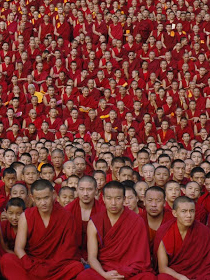- Home
- FPMT Homepage
Foundation for the Preservation of the Mahayana Tradition
The FPMT is an organization devoted to preserving and spreading Mahayana Buddhism worldwide by creating opportunities to listen, reflect, meditate, practice and actualize the unmistaken teachings of the Buddha and based on that experience spreading the Dharma to sentient beings. We provide integrated education through which people’s minds and hearts can be transformed into their highest potential for the benefit of others, inspired by an attitude of universal responsibility and service. We are committed to creating harmonious environments and helping all beings develop their full potential of infinite wisdom and compassion. Our organization is based on the Buddhist tradition of Lama Tsongkhapa of Tibet as taught to us by our founders Lama Thubten Yeshe and Lama Thubten Zopa Rinpoche.
- Willkommen
Die Stiftung zur Erhaltung der Mahayana Tradition (FPMT) ist eine Organisation, die sich weltweit für die Erhaltung und Verbreitung des Mahayana-Buddhismus einsetzt, indem sie Möglichkeiten schafft, den makellosen Lehren des Buddha zuzuhören, über sie zur reflektieren und zu meditieren und auf der Grundlage dieser Erfahrung das Dharma unter den Lebewesen zu verbreiten.
Wir bieten integrierte Schulungswege an, durch denen der Geist und das Herz der Menschen in ihr höchstes Potential verwandelt werden zum Wohl der anderen – inspiriert durch eine Haltung der universellen Verantwortung und dem Wunsch zu dienen. Wir haben uns verpflichtet, harmonische Umgebungen zu schaffen und allen Wesen zu helfen, ihr volles Potenzial unendlicher Weisheit und grenzenlosen Mitgefühls zu verwirklichen.
Unsere Organisation basiert auf der buddhistischen Tradition von Lama Tsongkhapa von Tibet, so wie sie uns von unseren Gründern Lama Thubten Yeshe und Lama Thubten Zopa Rinpoche gelehrt wird.
- Bienvenidos
La Fundación para la preservación de la tradición Mahayana (FPMT) es una organización que se dedica a preservar y difundir el budismo Mahayana en todo el mundo, creando oportunidades para escuchar, reflexionar, meditar, practicar y actualizar las enseñanzas inconfundibles de Buda y en base a esa experiencia difundir el Dharma a los seres.
Proporcionamos una educación integrada a través de la cual las mentes y los corazones de las personas se pueden transformar en su mayor potencial para el beneficio de los demás, inspirados por una actitud de responsabilidad y servicio universales. Estamos comprometidos a crear ambientes armoniosos y ayudar a todos los seres a desarrollar todo su potencial de infinita sabiduría y compasión.
Nuestra organización se basa en la tradición budista de Lama Tsongkhapa del Tíbet como nos lo enseñaron nuestros fundadores Lama Thubten Yeshe y Lama Zopa Rinpoche.
A continuación puede ver una lista de los centros y sus páginas web en su lengua preferida.
- Bienvenue
L’organisation de la FPMT a pour vocation la préservation et la diffusion du bouddhisme du mahayana dans le monde entier. Elle offre l’opportunité d’écouter, de réfléchir, de méditer, de pratiquer et de réaliser les enseignements excellents du Bouddha, pour ensuite transmettre le Dharma à tous les êtres. Nous proposons une formation intégrée grâce à laquelle le cœur et l’esprit de chacun peuvent accomplir leur potentiel le plus élevé pour le bien d’autrui, inspirés par le sens du service et une responsabilité universelle. Nous nous engageons à créer un environnement harmonieux et à aider tous les êtres à épanouir leur potentiel illimité de compassion et de sagesse. Notre organisation s’appuie sur la tradition guéloukpa de Lama Tsongkhapa du Tibet, telle qu’elle a été enseignée par nos fondateurs Lama Thoubtèn Yéshé et Lama Zopa Rinpoché.
Visitez le site de notre Editions Mahayana pour les traductions, conseils et nouvelles du Bureau international en français.
Voici une liste de centres et de leurs sites dans votre langue préférée
- Benvenuto
L’FPMT è un organizzazione il cui scopo è preservare e diffondere il Buddhismo Mahayana nel mondo, creando occasioni di ascolto, riflessione, meditazione e pratica dei perfetti insegnamenti del Buddha, al fine di attualizzare e diffondere il Dharma fra tutti gli esseri senzienti.
Offriamo un’educazione integrata, che può trasformare la mente e i cuori delle persone nel loro massimo potenziale, per il beneficio di tutti gli esseri, ispirati da un’attitudine di responsabilità universale e di servizio.
Il nostro obiettivo è quello di creare contesti armoniosi e aiutare tutti gli esseri a sviluppare in modo completo le proprie potenzialità di infinita saggezza e compassione.
La nostra organizzazione si basa sulla tradizione buddhista di Lama Tsongkhapa del Tibet, così come ci è stata insegnata dai nostri fondatori Lama Thubten Yeshe e Lama Zopa Rinpoche.
Di seguito potete trovare un elenco dei centri e dei loro siti nella lingua da voi prescelta.
- 欢迎 / 歡迎
简体中文
“护持大乘法脉基金会”( 英文简称:FPMT。全名:Foundation for the Preservation of the Mahayana Tradition) 是一个致力于护持和弘扬大乘佛法的国际佛教组织。我们提供听闻,思维,禅修,修行和实证佛陀无误教法的机会,以便让一切众生都能够享受佛法的指引和滋润。
我们全力创造和谐融洽的环境, 为人们提供解行并重的完整佛法教育,以便启发内在的环宇悲心及责任心,并开发内心所蕴藏的巨大潜能 — 无限的智慧与悲心 — 以便利益和服务一切有情。
FPMT的创办人是图腾耶喜喇嘛和喇嘛梭巴仁波切。我们所修习的是由两位上师所教导的,西藏喀巴大师的佛法传承。
繁體中文
護持大乘法脈基金會”( 英文簡稱:FPMT。全名:Found
ation for the Preservation of the Mahayana Tradition ) 是一個致力於護持和弘揚大乘佛法的國際佛教組織。我們提供聽聞, 思維,禪修,修行和實證佛陀無誤教法的機會,以便讓一切眾生都能 夠享受佛法的指引和滋潤。 我們全力創造和諧融洽的環境,
為人們提供解行並重的完整佛法教育,以便啟發內在的環宇悲心及責 任心,並開發內心所蘊藏的巨大潛能 — 無限的智慧與悲心 – – 以便利益和服務一切有情。 FPMT的創辦人是圖騰耶喜喇嘛和喇嘛梭巴仁波切。
我們所修習的是由兩位上師所教導的,西藏喀巴大師的佛法傳承。 察看道场信息:
- FPMT Homepage
- News/Media
-
- Study & Practice
-
-
- About FPMT Education Services
- Latest News
- Programs
- New to Buddhism?
- Buddhist Mind Science: Activating Your Potential
- Heart Advice for Death and Dying
- Discovering Buddhism
- Living in the Path
- Exploring Buddhism
- FPMT Basic Program
- FPMT Masters Program
- FPMT In-Depth Meditation Training
- Maitripa College
- Lotsawa Rinchen Zangpo Translator Program
- Universal Education for Compassion & Wisdom
- Online Learning Center
-
- Prayers & Practice Materials
- Overview of Prayers & Practices
- Full Catalogue of Prayers & Practice Materials
- Explore Popular Topics
- Benefiting Animals
- Chenrezig Resources
- Death & Dying Resources
- Lama Chopa (Guru Puja)
- Lama Zopa Rinpoche: Compendium of Precious Instructions
- Lama Zopa Rinpoche: Life Practice Advice
- Lama Zopa Rinpoche Practice Series
- Lamrim Resources
- Mantras
- Prayer Book Updates
- Purification Practices
- Sutras
- Thought Transformation (Lojong)
- Audio Materials
- Dharma Dates - Tibetan Calendar
- Translation Services
- Publishing Services
- Ways to Offer Support
- Prayers & Practice Materials
-
- Teachings and Advice
- Find Teachings and Advice
- Lama Zopa Rinpoche Advice Page
- Lama Zopa Rinpoche: Compendium of Precious Instructions
- Lama Zopa Rinpoche Video Teachings
- ༧སྐྱབས་རྗེ་བཟོད་པ་རིན་པོ་ཆེ་མཆོག་ནས་སྩལ་བའི་བཀའ་སློབ་བརྙན་འཕྲིན།
- Podcasts
- Lama Yeshe Wisdom Archive
- Buddhism FAQ
- Dharma for Young People
- Resources on Holy Objects
- Teachings and Advice
-
-
*If a menu item has a submenu clicking once will expand the menu clicking twice will open the page.
-
-
- Centers
-
- Teachers
-
- Projects
-
-
-
-
*If a menu item has a submenu clicking once will expand the menu clicking twice will open the page.
-
-
- FPMT
-
-
-
-
-
May there be no war, disease or natural disaster such as fire, flood, earthquake and so forth. May everybody realize bodhichitta, the good heart, enjoy peace and happiness and as quickly as possible realize the wisdom directly perceiving emptiness, cease all their defilements and achieve enlightenment.
Lama Zopa Rinpoche
-
-
-
- Shop
-
-
-
The Foundation Store is FPMT’s online shop and features a vast selection of Buddhist study and practice materials written or recommended by our lineage gurus. These items include homestudy programs, prayers and practices in PDF or eBook format, materials for children, and other resources to support practitioners.
Items displayed in the shop are made available for Dharma practice and educational purposes, and never for the purpose of profiting from their sale. Please read FPMT Foundation Store Policy Regarding Dharma Items for more information.
-
-
Lama Zopa Rinpoche News and Advice
3
The Real Meaning of Practicing the Dharma
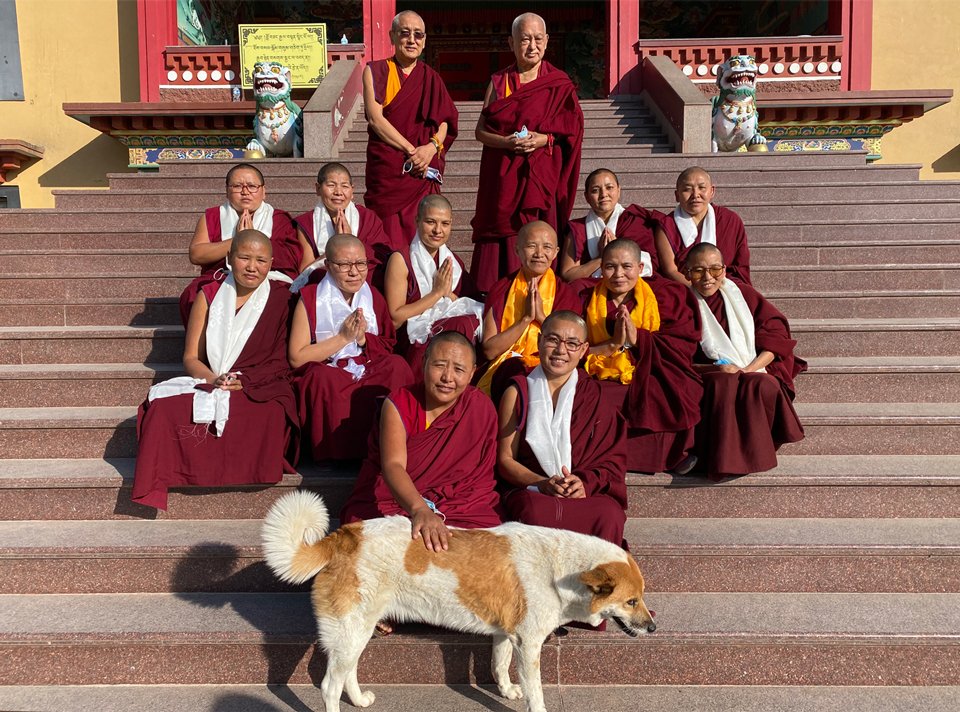
Lama Zopa Rinpoche and Khen Rinpoche Geshe Chonyi, nunnery abbot, with nuns who have completed their studies at Khachoe Ghakyil Ling, Nepal, November 2021. Photo by Ven. Roger Kunsang.
In the following short video from a teaching given in Madrid, Spain, in 2018, Lama Zopa Rinpoche discusses what it means to truly practice Dharma.
At beginning of this video, Rinpoche recalls how, many years ago while staying at Lawudo in Nepal, he read the text “At the Very Beginning, Thought Transformation Opening the Door of Dharma.” Due to reading this text, Rinpoche reviewed his life to check whether he had practiced actual Dharma and realized that nothing he had done up to that point was Dharma.
In the video, Rinpoche then recommends to students that if they are planning to do retreat they should familiarize themselves with this text. (Rinpoche mentions his books The Door to Satisfaction and How to Practice Dharma for more on this topic.)
Rinpoche then tells the story of a practitioner who met Gyalwa Dromtonpa, the translator of Atisha in Tibet. Each time this student met Dromtonpa, regardless of whether the student had read a text, meditated, or circumambulated a stupa, Dromtonpa told the student that what he had done was good, but it would be even better to practice Dharma. Eventually the student asked what Dromtonpa meant by that. Dromtonpa said, “Renounce this life.”
Rinpoche explains how all our problems come from our attachment to this life, and that our attachment creates unbelievable suffering for us. It leads to rebirth in lower realms. So we must renounce our attachment, Rinpoche says, we must give up the root of our problems.
“That is the start of Dharma practice,” Rinpoche says. “Then on the basis of that you develop [your practice]. On the basis of that, you achieve enlightenment. You come to omniscient mind. Then you benefit numberless sentient beings and bring them to enlightenment.”
What it means to practice Dharma is the first and most important thing to know, Rinpoche explains. Otherwise, there is the danger that the time that you do retreat or stay in a monastery and study is wasted when you don’t know how to practice holy Dharma.
Watch this teaching in the video “The Real Meaning of Practicing the Dharma”:
The above video is extracted from a teaching given on October 21, 2018, in Madrid, Spain. You can find more blogs with short video clips from Rinpoche’s teaching as well as the complete collection of these “Essential Extracts” videos on FPMT.org.
Watch videos from the ongoing series Lama Zopa Rinpoche’s Teachings on Thought Transformation and find links to transcripts, MP3s, additional practice advice, and more. Read an in-depth summary of Rinpoche’s thought transformation teachings given in 2020 in the Mandala 2021 article “The Time to Practice Is Now.”
Lama Zopa Rinpoche is the spiritual director of the Foundation for the Preservation of Mahayana Tradition (FPMT), a Tibetan Buddhist organization dedicated to the transmission of the Mahayana Buddhist tradition and values worldwide through teaching, meditation and community service.
31
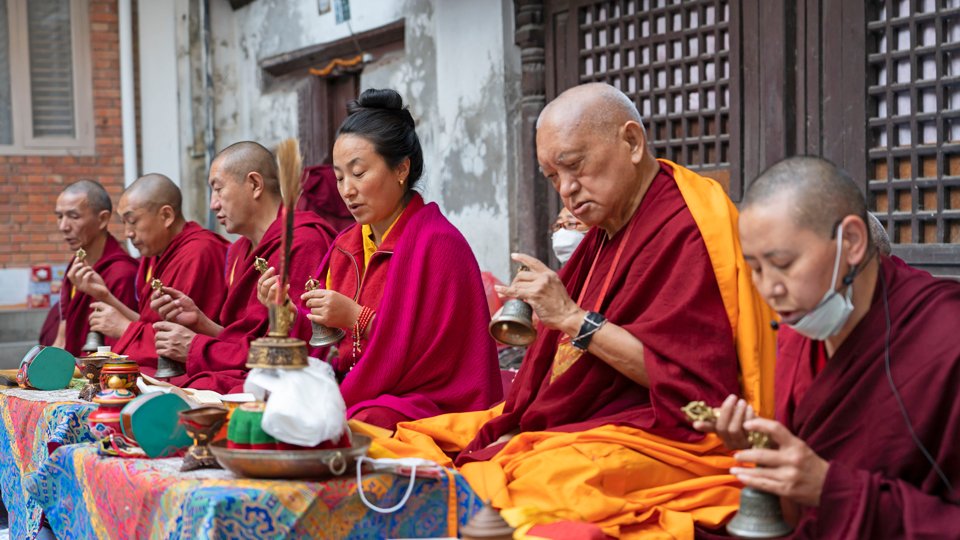
Lama Zopa Rinpoche and Khadro-la offering Tara Puja at Tara Temple in Kathmandu, Nepal, November 2021. Photo by Ven. Lobsang Sherab.
With the new year approaching, many of us are reflecting on the past year— rejoicing in the blessings we received, and also assessing mistakes we have made. Fortunately, we have methods at our disposal to help us purify negative karma we have created. We can utilize these practices daily, and also as a way to enter the new year with a renewed sense of resolve to be the best versions of ourselves, so we can be of most benefit to others.
During the ongoing video Thought Transformation Teachings that Lama Zopa Rinpoche has been offering from Kopan Monastery in Nepal, Rinpoche has, on several occasions, talked about purification practice. In “The Time to Practice is Now,” a detailed, overarching summary of the 2020 teachings published in Mandala, Rinpoche discusses the many benefits of having a perfect human rebirth, including how it grants us the opportunity to purify negative karma. Here’s an excerpt from this summary:
Rinpoche explains that having this one-time opportunity makes us unbelievably fortunate—a perfect human rebirth is more precious than the whole sky filled with wish-granting jewels. This is because even skies of wish-granting jewels don’t have the power to purify our negative karma and save us from the lower realms, nor can they give us liberation from samsara and enlightenment, but having a perfect human rebirth can do this.
We have been creating negative karma from beginningless rebirths, which is why it is so important to do purification practices in this life—before our negative karma ripens. Once it ripens, there’s nothing we can do; we must experience the result. Therefore, we need to do a purification practice every day. There are many practices we can do for purification, including Vajrasattva practice, prostrations to the Thirty-Five Confession Buddhas, and others. Although these formal purification practices are extremely effective in purifying our negative karma, Rinpoche explains that the most powerful thing we can do to purify our negative karma is to follow our guru’s advice and please our guru. But if we don’t realize how valuable and important these practices are and that having a perfect human rebirth gives us the perfect opportunity to do them, we might think it is better to spend our time at the beach swimming in the water like a fish!
Watch Rinpoche discuss the importance of purification practices in “Purify Now Because You Can Die Anytime”:
Watch the ongoing video series Lama Zopa Rinpoche’s Teachings on Thought Transformation on FPMT.org and find links to transcripts, MP3s, additional practice advice, and more. Read our summary article on Rinpoche’s 2020 teachings “The Time to Practice Is Now.”
You can find resources to support your purification practice on the Practices for Purification page:
https://fpmt.org/education/prayers-and-practice-materials/purification/
Lama Zopa Rinpoche is the spiritual director of the Foundation for the Preservation of Mahayana Tradition (FPMT), a Tibetan Buddhist organization dedicated to the transmission of the Mahayana Buddhist tradition and values worldwide through teaching, meditation and community service.
- Tagged: advice from lama zopa rinpoche, essential extract, essential extract thought transformation teachings, lama zopa rinpoche thought transformation video teaching, purification
27
About the Importance of Bodhicitta
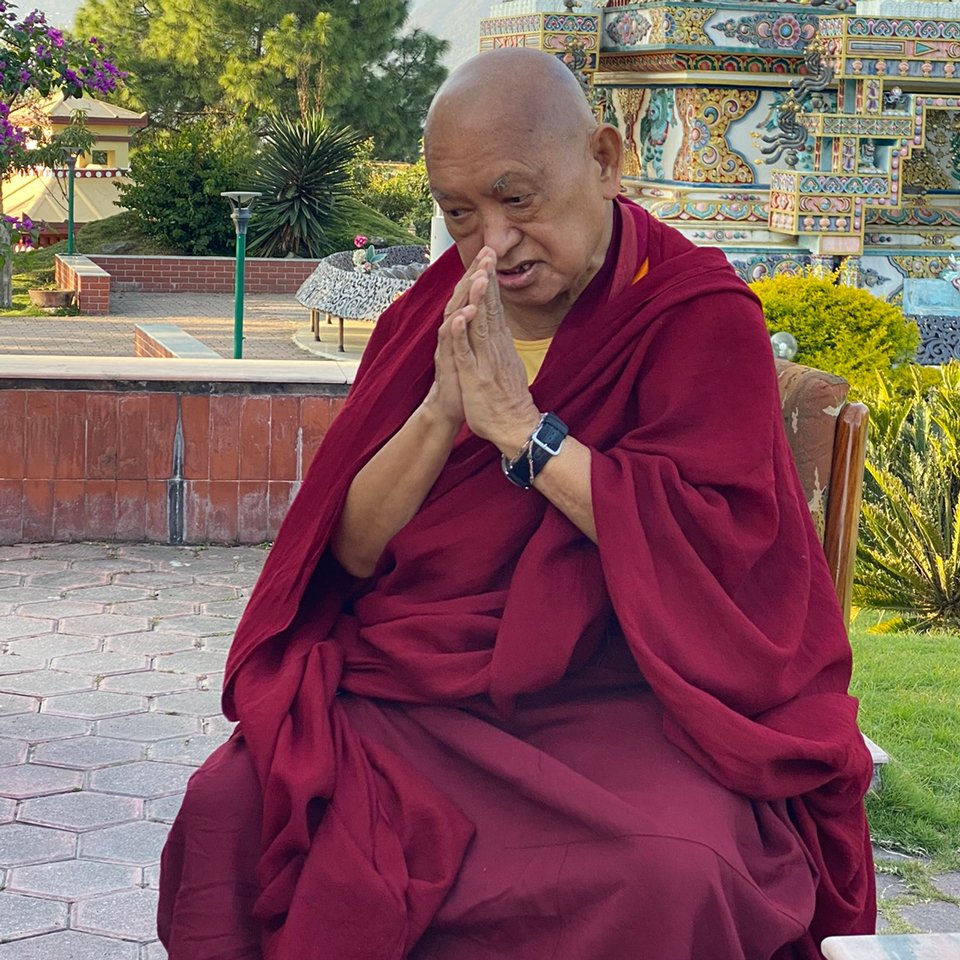
Lama Zopa Rinpoche in the stupa garden at Kopan Monastery, November 2021. Photo by Ven. Roger Kunsang.
In the following short video from a teaching given in Singapore in 2018, Lama Zopa Rinpoche explains the vast benefits of practicing bodhicitta. Here’s a summary of this teaching:
Lama Zopa Rinpoche discusses how having the mind of bodhicitta is the basis for all the happiness and peace of all sentient beings. Our bodhicitta eliminates the suffering of sentient beings.
It is important to understand, Rinpoche explains, how generating bodhicitta in everyday life leads to the happiness of all sentient beings. With the motivation of bodhicitta every action becomes worthwhile and rich. Any action done with bodhicitta collects skies of merit. Rinpoche emphasizes that when you practice bodhicitta, everyone is included, not even the tiniest fly is left out.
Reciting just one OM MANI PADME HUM with bodhicitta can benefit everyone. Rinpoche points out that we should become aware of how amazing this incredible benefit of practicing bodhicitta is.
When you practice bodhicitta, your life is unbelievably meaningful and useful. It is the most healthy and best life. “Living life with bodhicitta is the happiest life, you understand?” Rinpoche says. When you die with bodhicitta there is no problem. You die happy and your death also becomes meaningful. Whatever one does, even going to a party, should be done with the motivation of bodhicitta and be dedicated for the enlightenment of every sentient being.
Watch the video “About the Importance of Bodhichitta”:
The above video is extracted from a teaching given on September 19, 2018 at Amitabha Buddhist Centre in Singapore. You can find more blogs with short video clips from Rinpoche’s teaching as well as the complete collection of these “Essential Extracts” videos on FPMT.org.
Watch videos from the series Lama Zopa Rinpoche’s Teachings on Thought Transformation and find links to transcripts, MP3s, additional practice advice, and more. Read an in-depth summary of Rinpoche’s thought transformation teachings given in 2020 in the Mandala 2021 article “The Time to Practice Is Now.”
Lama Zopa Rinpoche is the spiritual director of the Foundation for the Preservation of Mahayana Tradition (FPMT), a Tibetan Buddhist organization dedicated to the transmission of the Mahayana Buddhist tradition and values worldwide through teaching, meditation and community service.
20
Open the Door to Your Happiness Now
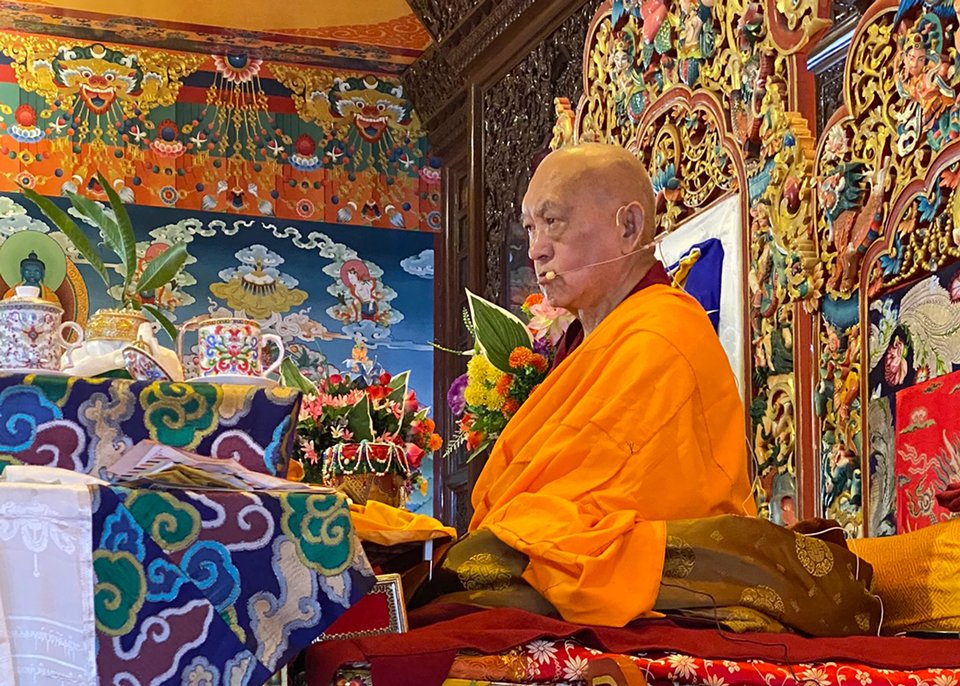
Lama Zopa Rinpoche teaching at Khachoe Ghakyil Nunnery, Nepal, November 2021. Photo by Ven. Roger Kunsang.
In the following short video from a teaching Lama Zopa Rinpoche gave in Munich, Germany, in 2018, Rinpoche explains the shortcomings of self cherishing and the benefits of cherishing others.
Lama Zopa Rinpoche begins by talking about the great bodhisattva Togme Sangpo, who said that all suffering comes from cherishing the I. Cherishing the I is the door to the suffering of oneself and of others. Only thinking of “me” and “When can I be happy?” causes suffering, not only harming yourself but harming other sentient beings. We have been creating this suffering since beginningless lifetimes.
We can change this by developing the attitude to serve others. Thinking about making others happy opens the door to all happiness for ourselves up to enlightenment. When you understand that the purpose of your life is to benefit others, everything changes. “The minute you change from the self-cherishing thought to cherishing others, right there, you don’t have to go anywhere, right there you found your happiness, you achieved happiness,” Rinpoche says.
Then referring to Shantideva’s Bodhicharyavatara, Rinpoche says that if you wish to quickly guide yourself and others, then you should do the practice of exchanging yourself for others. You change the self-cherishing thought into cherishing others. You should do this practice with your mind, and it should be done secretly. “You don’t advertise ‘I’m practicing bodhicitta,’” Rinpoche says. “You don’t announce it to the world. You just do it mentally.”
In closing Rinpoche says that whether it is one insect or one person, happiness and enlightenment come from cherishing others.
Watch the video “Open the Door to Your Happiness Now”:
The above video is extracted from a teaching given on November 10, 2018, in Munich, Germany. (You can watch more from Rinpoche’s 2018 European tour online.) You can find more blogs with short video clips from Rinpoche’s teaching as well as the complete collection of these “Essential Extracts” videos on FPMT.org.
The morning meditation Rinpoche refers to in this teaching is The Method to Transform a Suffering Life into Happiness (Including Enlightenment).
Lama Zopa Rinpoche is the spiritual director of the Foundation for the Preservation of Mahayana Tradition (FPMT), a Tibetan Buddhist organization dedicated to the transmission of the Mahayana Buddhist tradition and values worldwide through teaching, meditation and community service.
14
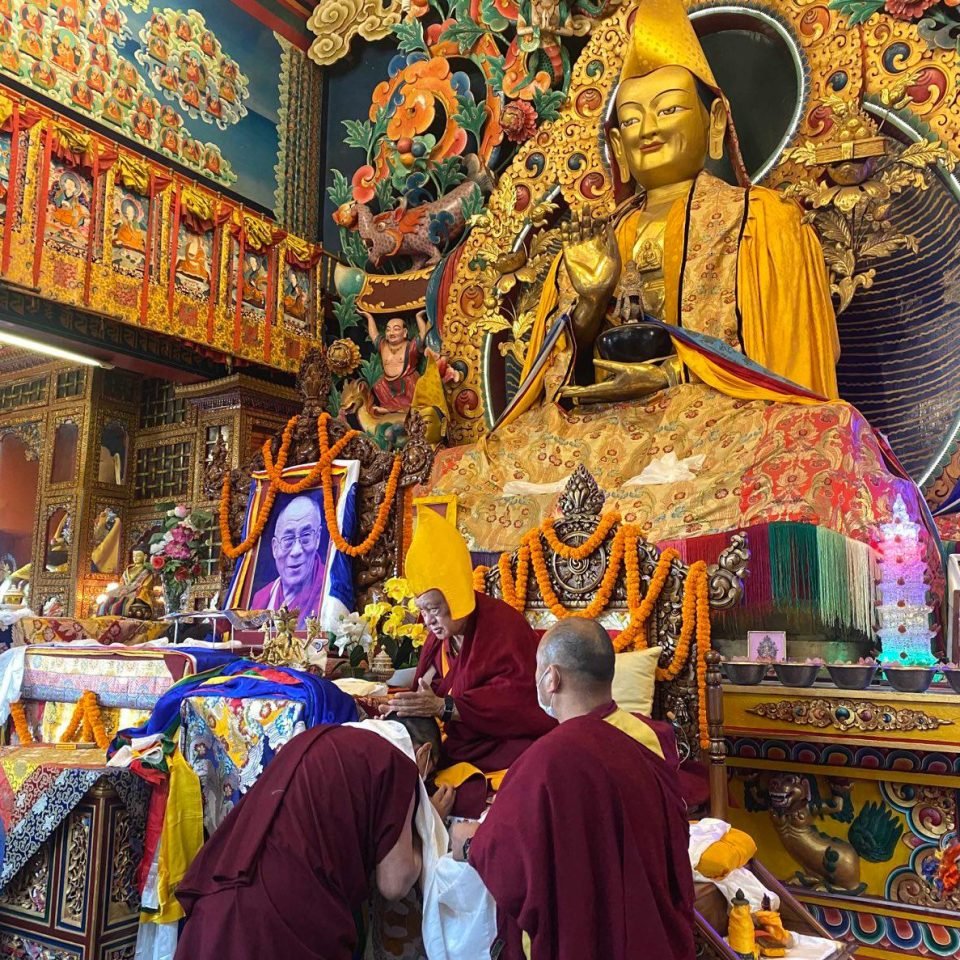
Lama Zopa Rinpoche during Sixteen Arhats long life puja offered to Rinpoche on his birthday, Kopan Monastery, Nepal, December 2021. Photo by Ven. Lhundrup Topgye.
The celebration of Lama Zopa Rinpoche’s birthday on December 3 began in the early morning with the offering of a Sixteen Arhats long life puja to Rinpoche in the main gompa at Kopan Monastery in Nepal.
During the offerings part of the puja, a group of monks carried in a beautiful large Tara statue. Ven. Roger Kunsang, Rinpoche’s assistant and CEO of FPMT Inc, offered the golden statue to Rinpoche on behalf of the entire FPMT organization. Rinpoche later offered the statue to Rangjung Neljorma Khadro Namsel Drönme (Khadro-la).
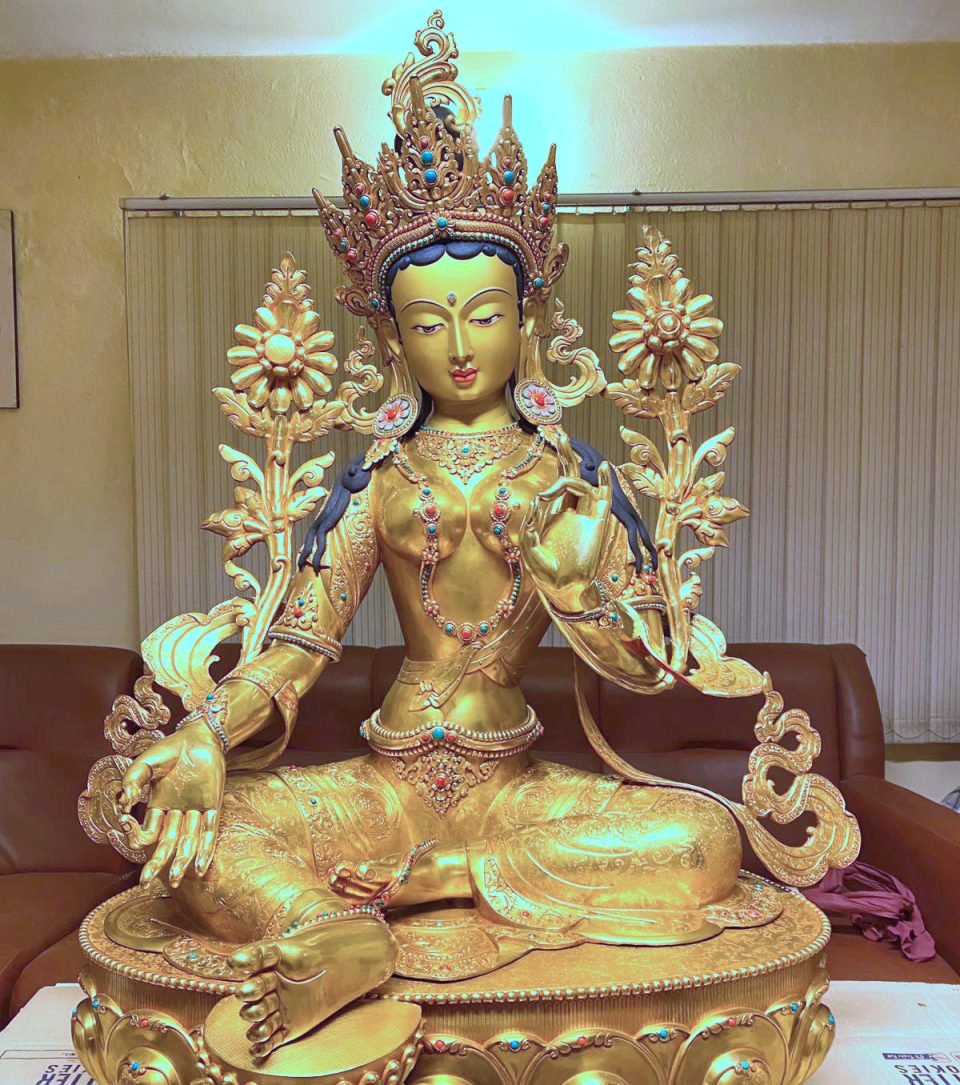
Tara statue offered to Lama Zopa Rinpoche during the Sixteen Arhats long life puja at Kopan Monastery
After the puja, a delicious buffet lunch with many dishes was prepared for all in the stupa garden at Kopan. Lama Zopa Rinpoche, Kopan monks and nuns, and guests sat among the stupas for Geshe Lama Konchog and Khensur Rinpoche Lama Lhundrup. A tent and table were set up for Rinpoche. Kopan Abbot Khen Rinpoche Geshe Chonyi was present for the events as well as Rinpoche’s brother Sangye and his family.
After lunch, Rinpoche was presented with a large tiered birthday cake. A group of young monks, including Rigsel Rinpoche, the reincarnation of Khensur Rinpoche Lama Lhundrup, sang “Happy Birthday” to Rinpoche while holding khatas. They also sang praises to different gurus.
Rinpoche turned the birthday cake into a tsog offering. He made a nice dedication to His Holiness the Dalai Lama. He then cut the first slice of cake.
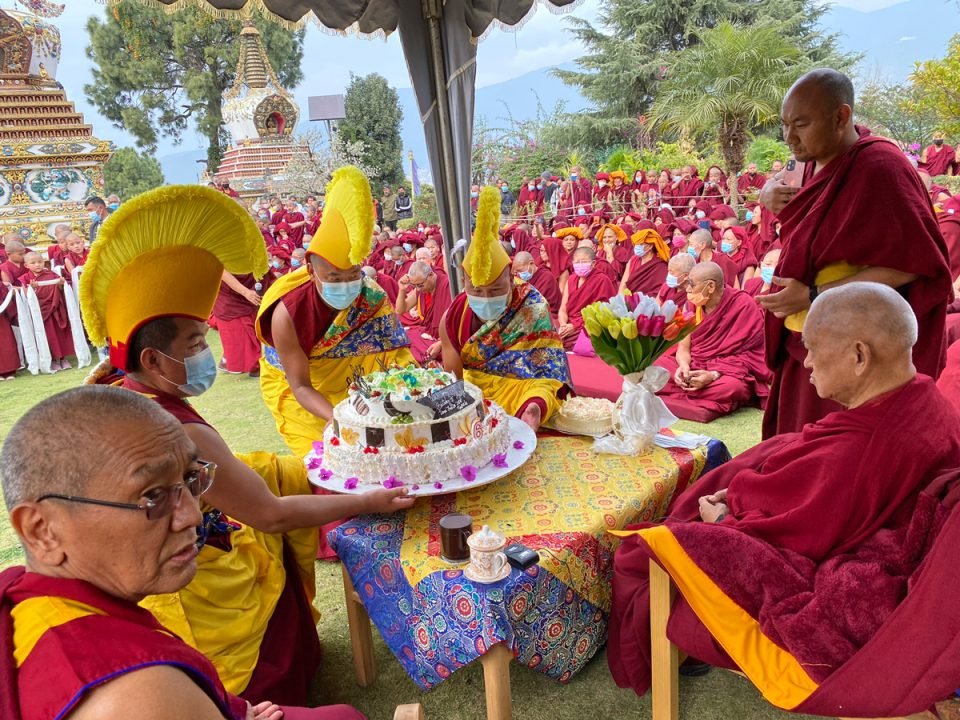
Offering cake to Lama Zopa Rinpoche on his birthday, Kopan Monastery, Nepal, December 3, 2021. Photo by Ven. Roger Kunsang.
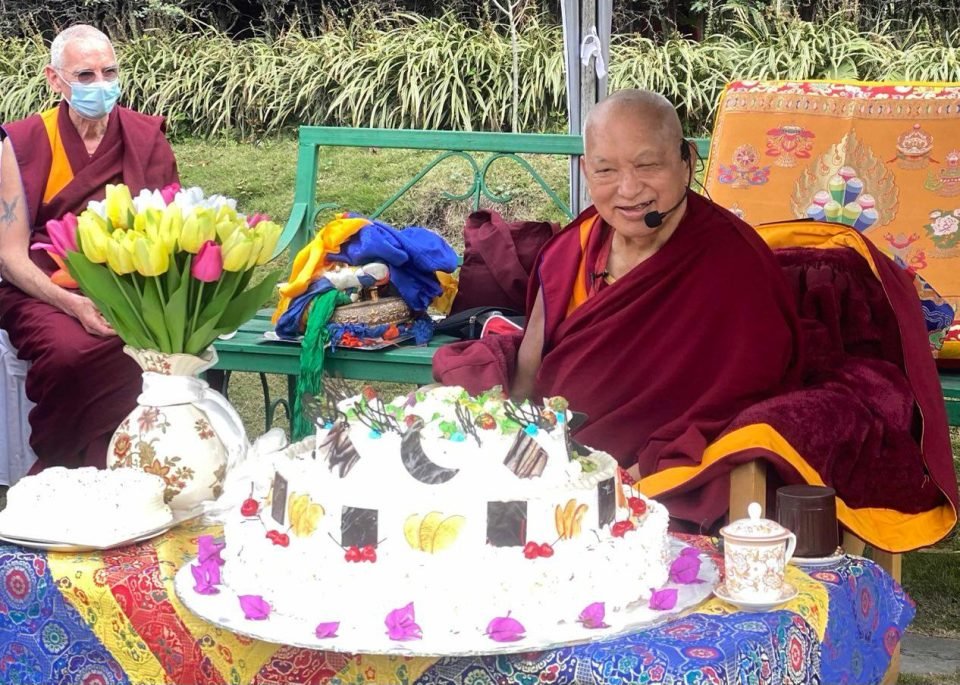
Lama Zopa Rinpoche with the birthday cake offered to him, Kopan Monastery, Nepal, December 2021. Photo by Ven. Lhundrup Topgye.
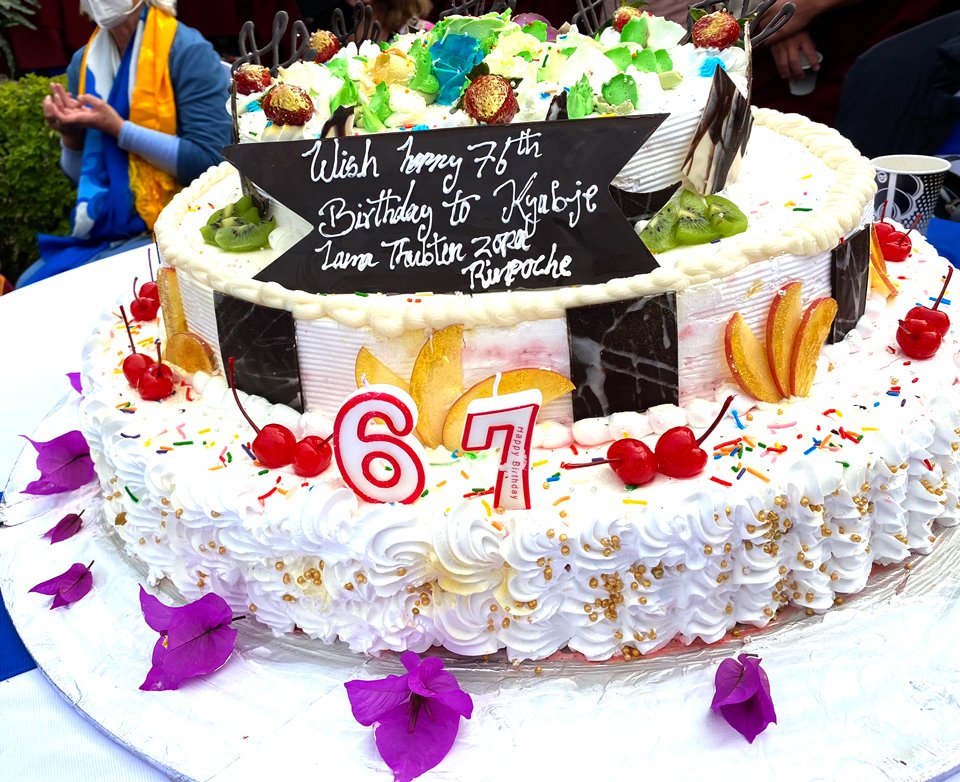
Birthday cake offered to Lama Zopa Rinpoche on his birthday, celebrated at Kopan Monastery, Nepal, December 3, 2021. Photo by Ven. Roger Kunsang.
Also during the afternoon, there was a musician playing dramyin, who accompanied the young monks singing. A group of monks, some dressed in costumes, including young monks dressed up as goats, performed a series of short plays for all gathered in the garden. The final play was a story from the life of Geshe Ben Gungyal. Afterwards, the performers offered khatas to Rinpoche.
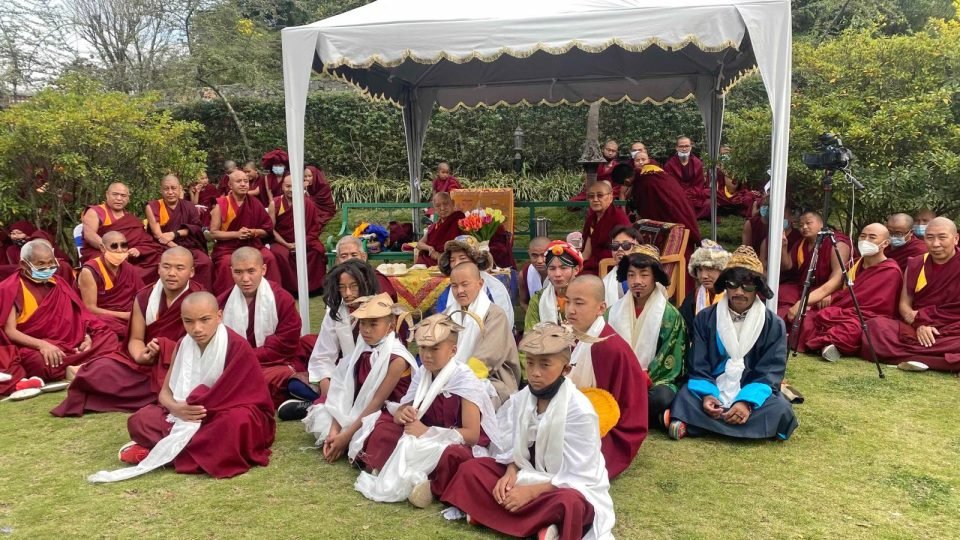
Monks who offered plays for Lama Zopa Rinpoche’s birthday celebration with Rinpoche at the close of the event, Kopan Monastery, Nepal, December 2021. Photo by Ven. Lhundrup Topgye.
Thanks to Ven. Roger Kunsang, CEO of FPMT Inc., and Frances Howland, FPMT South Asia Regional Coordinator, for details on the event. For more, you can find videos of the celebration of Lama Zopa Rinpoche’s birthday on the Facebook pages of Kopan Monastery and Kopan Monastery School.
You can watch videos from the ongoing series Lama Zopa Rinpoche’s Teachings on Thought Transformation, recorded at Kopan Monastery. Find links to transcripts, MP3s, additional practice advice, and more on the video series page on FPMT.org.
Lama Zopa Rinpoche is the spiritual director of the Foundation for the Preservation of Mahayana Tradition (FPMT), a Tibetan Buddhist organization dedicated to the transmission of the Mahayana Buddhist tradition and values worldwide through teaching, meditation and community service.
8
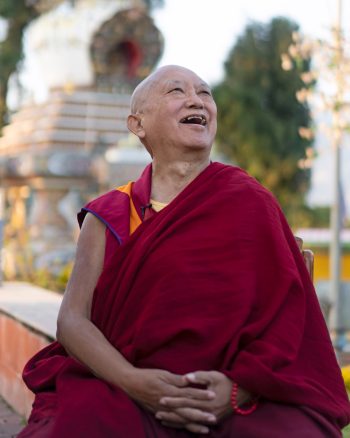
Lama Zopa Rinpoche in the stupa garden at Kopan Monastery, November 2021. Photo by Ven. Roger Kunsang.
Lama Zopa Rinpoche wrote this letter to a student who was in the middle of a relationship break-up.
Hi, I think you are having a great realization of life. May I tell you little bit about this, how it is a great realization, a discovery—actually you are on the Discovery Channel. This helps you to realize how samsara is in the nature of suffering, the three types of suffering and the six types of suffering. There is nothing definite in samsara, and you can never get satisfaction from samsaric pleasures, perfections, enjoyments, materials, or friends.
This realization becomes the cause for generating renunciation; it becomes the basis for generating great compassion; it becomes the basis for bodhichitta and for achieving the entire Mahayana path. Because this higher path has skies of qualities, you can achieve enlightenment, then you can enlighten all suffering beings, and before that you can liberate them from samsaric suffering.
Now you can see how all sentient beings’ happiness, including great enlightenment, comes from this root that you are discovering. WOW! I was saying how it is so positive, it is incredible. It is an extremely important discovery in your life. It is a very important education, something very precious that you need, that we need. Now there is only great joy. You can see how she is most incredibly kind, giving you enlightenment.
This advice “Relationship Break-Up” was originally published in “Lama Zopa Rinpoche’s Online Advice Book” on the Lama Yeshe Wisdom Archive (LamaYeshe.com).
Watch the ongoing video series Lama Zopa Rinpoche’s Teachings on Thought Transformation on FPMT.org and find links to transcripts, MP3s, additional practice advice, and more.
Lama Zopa Rinpoche is the spiritual director of the Foundation for the Preservation of Mahayana Tradition (FPMT), a Tibetan Buddhist organization dedicated to the transmission of the Mahayana Buddhist tradition and values worldwide through teaching, meditation and community service.
- Tagged: advice from lama zopa rinpoche, lywa, relationships
6
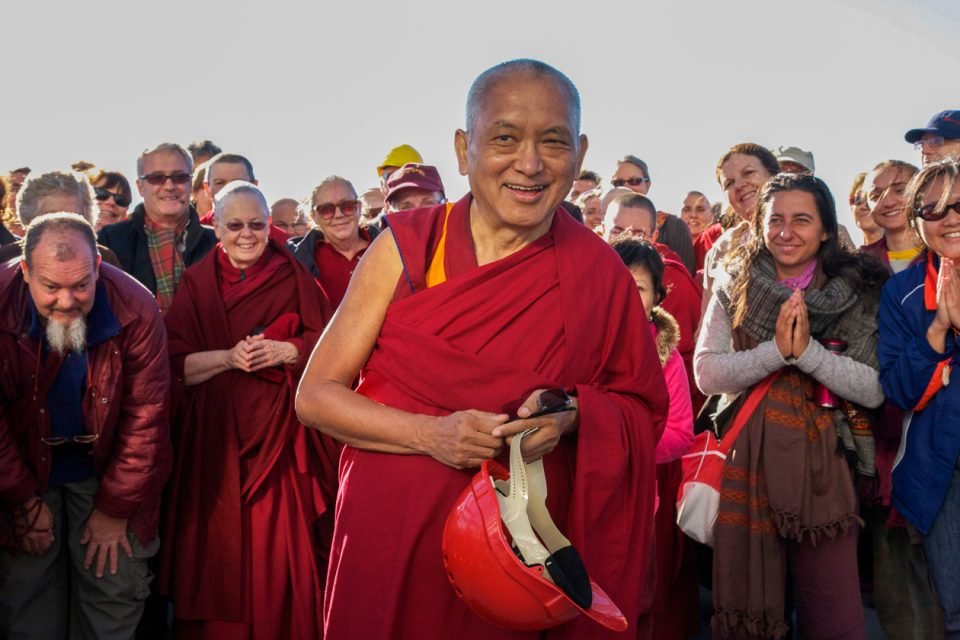
Lama Zopa Rinpoche at the Great Stupa of Universal Compassion, Bendigo, Australia, April 2011. Photo by Ven. Roger Kunsang.
In early April 2011, Lama Zopa Rinpoche began teaching a retreat series at the Great Stupa of Universal Compassion in Bendigo, Australia, focused on Shantideva’s Bodhicaryavatara (A Guide to the Bodhisattva’s Way of Life) and the transmission of the rare Rinjung Gyatsa initiations. Co-hosted by the Great Stupa, Atisha Centre, and Thubten Shedrup Ling Monastery, and attended by nearly 200 students, Rinpoche taught for about ten days before manifesting the symptoms of a stroke. Now for the first time, these precious teachings from Rinpoche have been made publicly available and can be streamed for free.
Rinpoche continued his teaching of Bodhicaryavatara and Rinjung Gyatsa retreat series at the Great Stupa in September-October 2014 and April-May 2018, and was scheduled to lead the March-April 2020 retreat, which was postponed due to the pandemic.
You can read more about the April 2011 retreat and Rinpoche manifesting a stroke in two articles from Mandala July-September 2011: “The Retreat of a Lifetime” and “When the Guru Manifests a Stroke.” You can also watch archival video footage from the retreat in the story “Remembering a Retreat of a Lifetime.”
Visit this page to find all the videos, transcripts, and audio files for Rinpoche’s Bendigo April 2011 teachings:
https://fpmt.org/media/streaming/teachings-of-lama-zopa-rinpoche/lama-zopa-rinpoche-teachings-in-bendigo-australia-2011
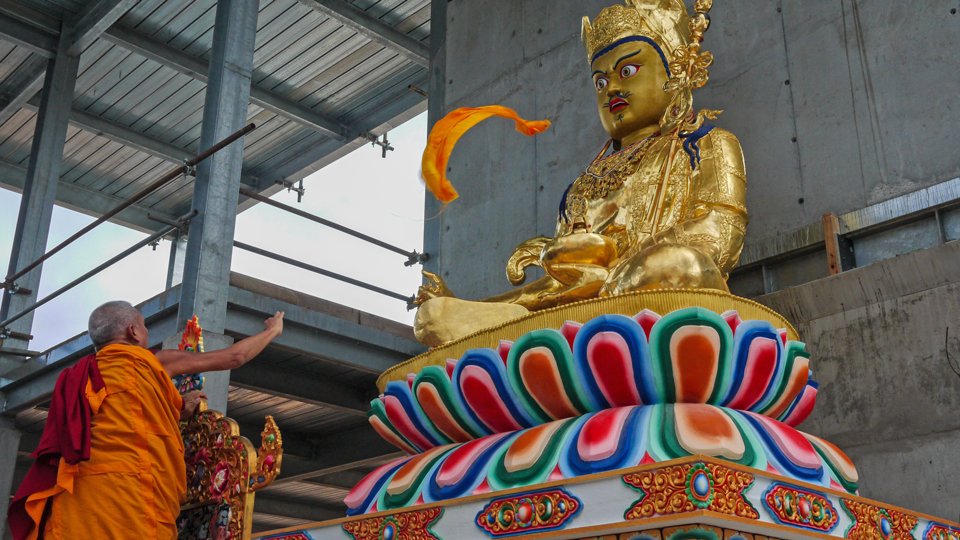
Lama Zopa Rinpoche offering a khata to Guru Rinpoche at the Great Stupa of Universal Compassion, Bendigo, Australia, April 2011. Photo by Ven. Thubten Kunsang.
Watch the current video series Lama Zopa Rinpoche’s Teachings on Thought Transformation on FPMT.org and find links to transcripts, MP3s, additional practice advice, and more.
Lama Zopa Rinpoche is the spiritual director of the Foundation for the Preservation of Mahayana Tradition (FPMT), a Tibetan Buddhist organization dedicated to the transmission of the Mahayana Buddhist tradition and values worldwide through teaching, meditation and community service.
- Tagged: australia, australia retreat 2011, bendigo, fpmt australia, great stupa of universal compassion, lama zopa rinpoche, video
2
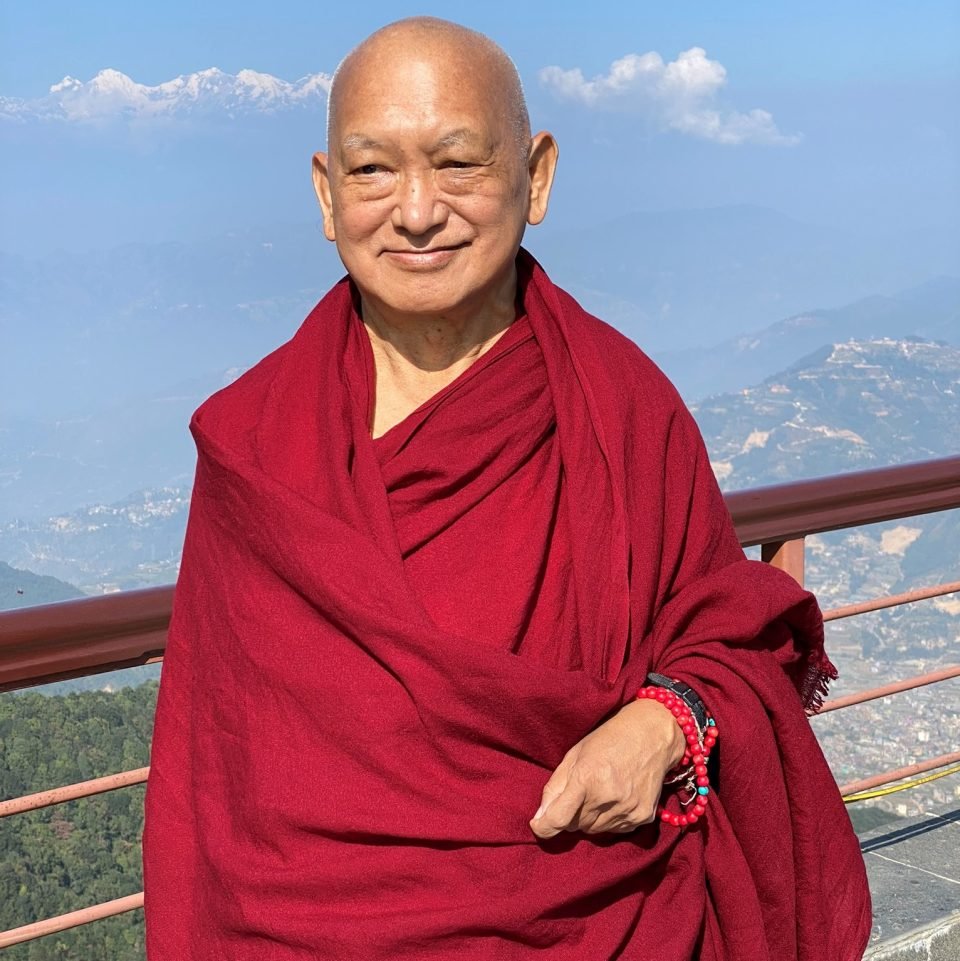
Lama Zopa Rinpoche, Nepal, November 2021. Photo by Ven. Roger Kunsang.
Lama Zopa Rinpoche’s birthday is celebrated on December 3. We invite you to join the entire FPMT community as we rejoice in another year of Rinpoche’s compassionate life. Rinpoche tirelessly models the bodhichitta motivation for us, benefiting countless others every single moment of every day.
A celebration for Rinpoche will begin at Kopan Monastery on the morning of December 3. We look forward to sharing all the joyous details of this celebration.
Through his recent activities and teachings, Rinpoche continues to guide us so that we make the most of this precious human rebirth by benefiting others and not causing harm. It is not enough to achieve liberation from samsara for oneself alone, Rinpoche regularly reminds us. We must aspire to liberate every single numberless sentient being from the oceans of samsaric suffering and bring them to enlightenment. Rinpoche is a living example of these teachings. And we can all find inspiration in how Rinpoche offers compassion to all living beings without a single one left out, including the most vulnerable, feared, harmful, and difficult among us.
Please join the entire FPMT community, including students and friends around the world, in offering sincere prayers for Lama Zopa Rinpoche’s long and healthy life. (All are welcome to download Long Life Prayers for Lama Zopa Rinpoche.) Rinpoche, please, please live long!
Lama Zopa Rinpoche is the spiritual director of the Foundation for the Preservation of Mahayana Tradition (FPMT), a Tibetan Buddhist organization dedicated to the transmission of the Mahayana Buddhist tradition and values worldwide through teaching, meditation, and community service.
Watch Lama Zopa Ripoche’s current video series on thought transformation and find links to videos in transcripts, MP3s, additional practice advice, and more:
https://fpmt.org/fpmt/announcements/resources-for-coronavirus-pandemic/advice-from-lama-zopa-rinpoche-for-coronavirus/
29
How Anger and Patience Relate to Each Other
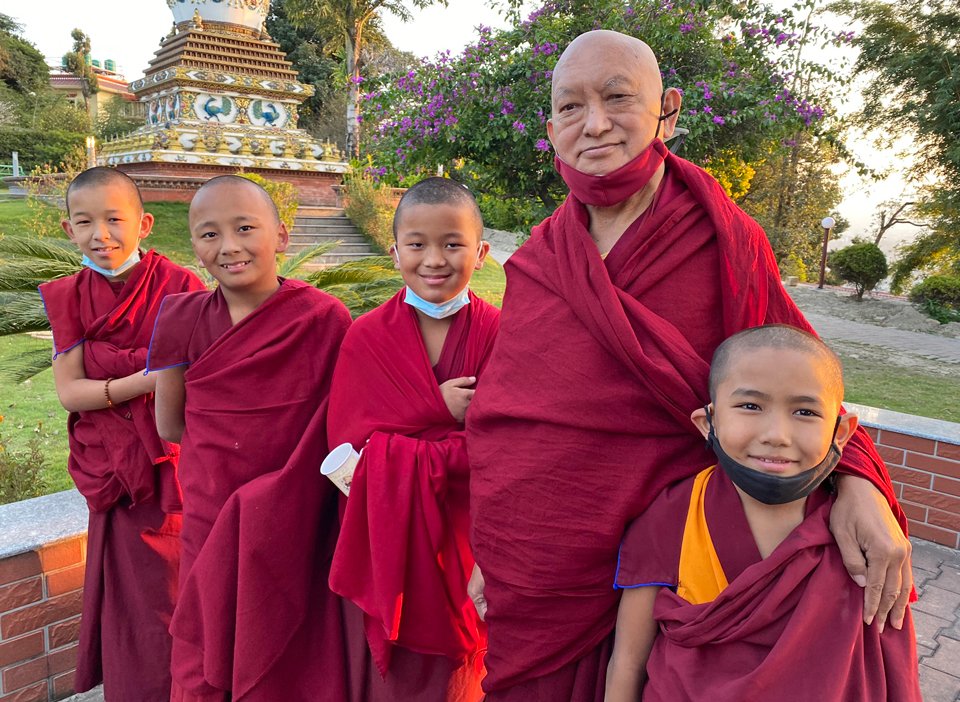
Lama Zopa Rinpoche with Rigsel Rinpoche (on right) and other young monks, Kopan Monastery, Nepal, November 2021. Photo by Ven. Roger Kunsang.
In the following short video recorded during the 2018 retreat at Great Stupa of Universal Compassion in Australia, Lama Zopa Rinpoche responds to a question about how to practice patience:
In order to practice patience, we first must have a strong understanding of how harmful anger is, Rinpoche explains. If we don’t understand the danger of anger, then we won’t be persuaded to practice patience.
We need to think about the negative karma that is created by anger. However when we are angry, we don’t care about karma and are capable of doing terrible actions. That is why we need to understand that this nonvirtue results in future suffering and causes so many problems. “What you have to remember is this, how the anger is so harmful. First you have to recognize that,” Rinpoche says.
Then, quoting the great bodhisattva Shantideva’s Bodhicharyavatara, Rinpoche says, “‘For a thousand eons you made offerings to the Gone to Bliss Ones and made charity to other sentient beings, for a thousand eons, so merits collected by making offerings to Buddha and charity to other sentient beings, by rising anger one second it destroys all the merits.’ … You understand? It completely gets destroyed. You have to understand how anger is so dangerous.”
Not only does anger create future suffering, it destroys our merit. So we need to develop our understanding of the results of anger to motivate us to practice patience, which will change how we see the object of our anger.
Watch the video “How Anger and Patience Relate to Each Other”:
The above video is extracted from a teaching given on May 10, 2018, during the retreat at the Great Stupa of Universal Compassion in Bendigo, Australia. You can find more short video clips of Rinpoche’s teachings in the “Essential Extracts” video collection on FPMT.org.
Watch videos from the series Lama Zopa Rinpoche’s Teachings on Thought Transformation and find links to transcripts, MP3s, additional practice advice, and more. Read an in-depth summary of Rinpoche’s thought transformation teachings given in 2020 in the Mandala 2021 article “The Time to Practice Is Now.”
Lama Zopa Rinpoche is the spiritual director of the Foundation for the Preservation of Mahayana Tradition (FPMT), a Tibetan Buddhist organization dedicated to the transmission of the Mahayana Buddhist tradition and values worldwide through teaching, meditation and community service.
- Tagged: advice from lama zopa rinpoche, anger, essential extract, karma, patience, video
24

Domestic turkeys, Vardane-Verino, Adlersky District, Sochi, Russian, October 2016. Photo by SKas, CC BY-SA 4.0, via Wikimedia Commons.
The American holiday of Thanksgiving is celebrated each year in late November. Lama Zopa Rinpoche gave extensive advice in 2018 on how to help the tens of millions of turkeys being killed for the holiday, and also how to think about this tradition of killing and eating turkeys. Here is an excerpt and short summary from this advice, called “Prayers and Practices to Do for Turkeys at Thanksgiving”:
“On Thanksgiving eve, 2018, the Sangha in Switzerland and I did extensive prayers for those who rely on me, those for whom I promised to pray, those whose names were given to me, and, in particular, all the turkeys killed for Thanksgiving. We also did Vajrasattva purification, the King of Prayers, and the Amitabha Buddha Prayer to be Reborn in the Land of Bliss. All these practices were dedicated for all beings, but especially for all the turkeys killed for Thanksgiving,” Rinpoche says.
“If you are Buddhist, or just someone who does not want to suffer now or in endless future lives as well, having to experience unbelievably suffering, you need to purify your past negative karma and stop creating any more so that you will not be reborn as a turkey over and over again. … If you do have to eat turkey because of some family obligation, then at least do some mantras and prayers to benefit the turkeys, such as the four immeasurables with tonglen. Otherwise, if you just enjoy eating turkey together with the rest of the Americans who are not Buddhist, who do not know Dharma, who have not generated compassion for the turkeys, you create much negative karma.”
To purify past negative karma, Rinpoche gives detailed advice on doing Vajrasattva practice with the four opponent powers. Rinpoche recommends for those who can to take the eight Mahayana precepts. He also recommends reciting prayers from the Eight Prayers to Benefit the Dead, doing a nyung na retreat, reciting the four immeasurable and tonglen, reciting the Golden Light Sutra and Vajra Cutter Sutra, doing Chenrezig practice and Medicine Buddha puja, and the recitation of several specific mantras. Rinpoche also explains how to dedicate your practice in order to purify the already created negative karma to be reborn as a turkey and to not create such karma in the future.
“These are simple methods, but they have unbelievably profound benefits, like the sky. You can also do more or different practices as well. These are just suggestions. You can also do these practices at Christmas or on other occasions where turkeys and so many other animals are sacrificed and eaten,” Rinpoche explains.
For links to practice materials and detailed instructions, see “Prayers and Practices to Do for Turkeys at Thanksgiving”:
https://fpmt.org/teachers/zopa/advice/turkeys-at-thanksgiving/
Further Commentary and Advice for Thanksgiving
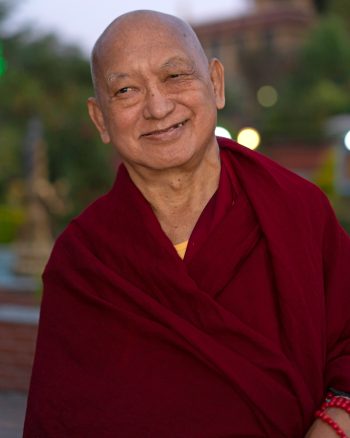
Lama Zopa Rinpoche, Kopan Monastery, Nepal, November 2021. Photo by Ven. Lobsang Sherab.
by Lama Zopa Rinpoche
I don’t think the general population of America accepts clairvoyance, but if it did, people would understand where all the sufferings, such as depression, come from. The way people normally think—for example, what causes depression—is very limited. They only think about things that are to do with this life. If they had clairvoyance they could see much deeper; they could see things such as past and future lives. People normally think of only this life, not past and future lives.
In the past, many of the turkeys that Americans are eating were Americans who in the past had killed turkeys. Often it could even be a past family member that they are now eating.
There’s a sutra story about Buddha’s disciple Shariputra, who excelled in wisdom. Once when he was on his alms round he looked into a family’s house and saw that the father, who used to catch fish in his backyard pond, had died and been reborn as a fish in that pond. The mother, his wife, who had been very attached to the home, had also died and been reborn as the family dog. And the son’s enemy, who had been very attached to the son’s wife, had died and been reborn as their child. The son was holding the child, his former enemy, eating the fish, his late father, and beating the dog, his late mother, while it chewed on fish bones. Shariputra then observed, “The son is eating his father’s flesh, beating his mother with a stick, and cuddling his enemy on his lap—samsaric existence makes me laugh.”
If we have animals we have to remember this story and take care of them well. It is very important to understand the benefits of taking care of our pets and other animals by giving them food and drink. Think that you are making charity and don’t just do it out of attachment, thinking that you love the shape of the animals or something, doing everything simply for your own happiness. It’s the same with looking after your children. You create a child with attachment, for your own happiness, thinking how your life would be unbelievably happy if you had a child. Then you take care of the child, but it is for your own happiness.
It is also important to recognize and remember your animals’ most unbelievable kindness, how they have been kind to you in three ways, and then with that awareness give them food and drink. First recite OṂ MAṆI PADME HŪṂ and then blow over the food and drink to bless it. If you have mani pills, it’s good to crush them and put them into the food and drink, or even add blessed water. You don’t have to get blessed water from a lama; you can make it yourself. Whether or not you have daily commitments, recite OṂ MAṆI PADME HŪṂ and other mantras, such as OṂ PADMO UṢHṆĪṢHA VIMALE HŪṂ PHAṬ, the Mitrugpa mantra and so forth, and then blow on the water. You can recite however many repetitions of each mantra you want, like seven, ten, fifteen, or more, blow on the animal’s food or water and make prayers as well. Similarly, you can keep a bottle of water nearby and when you’ve done your commitments you can blow on the water and then use that to put on the food and water that you give to the animals.
Then make this dedication prayer:
Due to all the past, present, and future merits collected by me and all the merits of the three times collected by numberless buddhas and numberless sentient beings, may all these animals (you can also include your family members, especially your father and mother) never ever get reborn back into the lower realms but be reborn in a pure land where they can achieve enlightenment, or, if not, at least receive a perfect human body, meet the Mahayana teachings, and a perfectly qualified guru revealing the unmistaken path to enlightenment, and by pleasing the holy mind of the virtuous friend may they attain enlightenment as quickly as possible.
Finally, please remember the unbelievable benefits of making charity of food to the animals. As the Buddha said, “Anybody who makes charity well during the period my teachings exist will receive great enjoyments for 80,000 eons, even if the material that person offers is merely the size of a hair. That person will be free from pain and disease, will enjoy great happiness, will be enriched with all manner of desirable things, and will eventually achieve the result: peerless cessation and complete enlightenment.”
This advice has been extracted from the page “Prayers and Practices to Do for Turkeys at Thanksgiving,” which shares a teaching and advice given by Lama Zopa Rinpoche in Switzerland in 2018. Scribed by Holly Ansett. Edited by Nicholas Ribush, November 2020.
For more mantras and resources for mantra recitation, visit FPMT Education Services’ page on mantras. You can find a full catalogue of all FPMT prayers, practices, and advice materials on FPMT.org.
Lama Zopa Rinpoche is the spiritual director of the Foundation for the Preservation of Mahayana Tradition (FPMT), a Tibetan Buddhist organization dedicated to the transmission of the Mahayana Buddhist tradition and values worldwide through teaching, meditation and community service.
- Tagged: thanksgiving
22
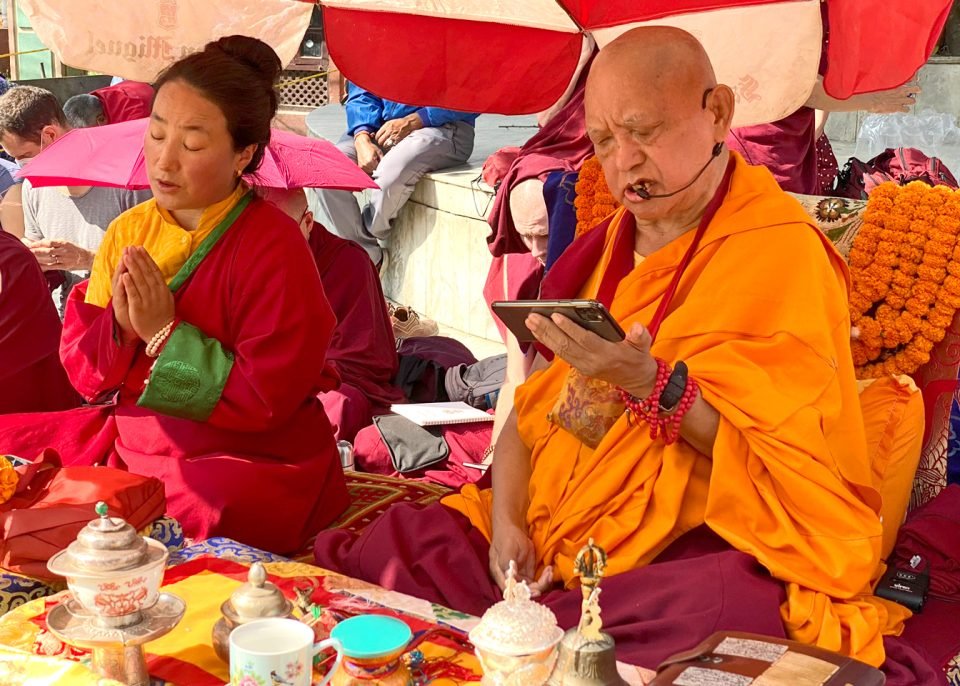
Lama Zopa Rinpoche and Khadro-la doing puja on Lhabab Duchen at Swayambunath, Nepal, October 2021. Photo by Ven. Roger Kunsang.
In the following short video from the 2019 Vajaryogini retreat at Institute Vajra Yogini, Lama Zopa Rinpoche guides us through the reasoning why we should be very grateful to those who hate or abuse us:
When you understand that the person who you call “enemy” is an obscured, suffering sentient being, then you can generate compassion based on that understanding, Rinpoche explains. Generating compassion is the basis for all the buddhas and all our good karma and happiness, Rinpoche says, describing the process for this step by step.
“Present and future [happiness], up to and including enlightenment, everything came from your good karma, that which is the buddhas’ holy actions. So your past, present, and future, all three-time happiness, you receive from the buddhas,” Rinpoche explains. “So a buddha came from a bodhisattva, a bodhisattva came from bodhichitta, bodhichitta came from great compassion, great compassion is generated by depending on, by the kindness of, the person whom you call ‘enemy,’ who abuses you, who doesn’t love you, who is angry with you.”
The person you think of as “enemy” is also the object of your practice of patience. Instead of anger towards that person, you can develop your patience and complete the paramita of patience. “If you cherish that person, you achieve enlightenment from that person. That person gives you enlightenment,” Rinpoche says.
Rinpoche also emphasizes how important it is to have compassion for all beings. He then explains that to have an actual Dharma practice, one that isn’t just words, you must cherish those that you don’t like or who hurt you.
“If you don’t cherish that person whom you call enemy, there is no enlightenment at all. It is sooooo important to cherish that [person]. If you are able to cherish them, then there is enlightenment,” Rinpoche explains. “Those things are the most important practice in our daily life!”
Watch the video “It Is Only Due to the Kindness of Your Enemy That You Can Reach Enlightenment”:
Read the transcript of Rinpoche’s teaching.
The above video is extracted from a teaching given on May 16, 2019, during the Vajrayogini retreat at Institut Vajra Yogini in France. You can find more blogs with short video clips from Rinpoche’s teaching as well as the complete collection of these “Essential Extracts” videos on FPMT.org.
Watch videos from the series Lama Zopa Rinpoche’s Teachings on Thought Transformation and find links to transcripts, MP3s, additional practice advice, and more. Read an in-depth summary of Rinpoche’s thought transformation teachings given in 2020 in the Mandala 2021 article “The Time to Practice Is Now.”
Lama Zopa Rinpoche is the spiritual director of the Foundation for the Preservation of Mahayana Tradition (FPMT), a Tibetan Buddhist organization dedicated to the transmission of the Mahayana Buddhist tradition and values worldwide through teaching, meditation and community service.
16
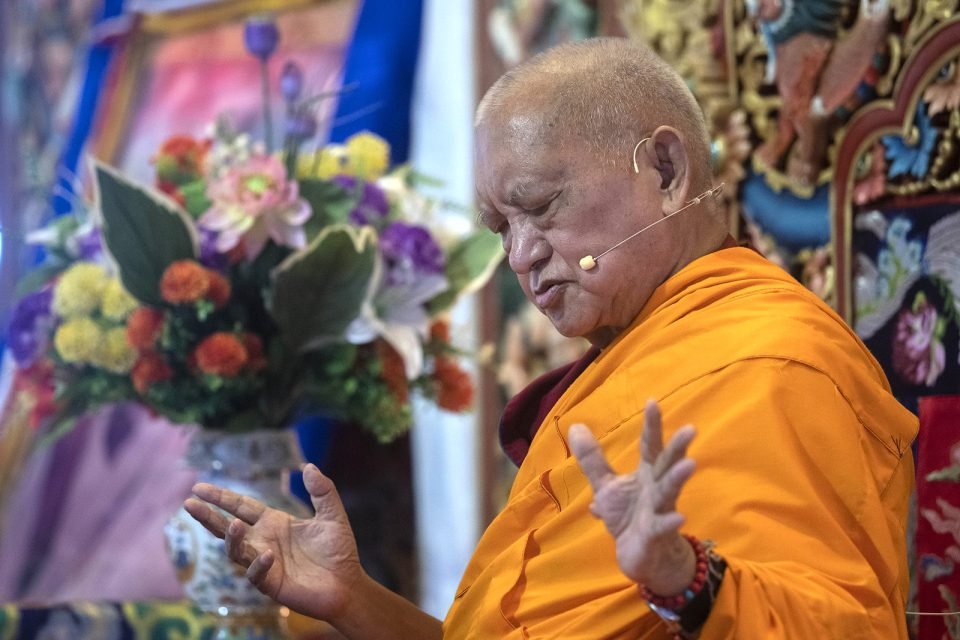
Rinpoche giving teachings at Khachoe Ghakyil Ling, Nepal, October 2021. Photo by Ven. Lobsang Sherab.
Since our last update, Lama Zopa Rinpoche has remained in Nepal and has been offering two ongoing teaching events. Rinpoche also celebrated Lhabab Duchen, gave advice via video at the fortieth anniversaries of two FPMT centers, and engaged in many other beneficial activities. We invite you to enjoy some of the details of Rinpoche’s compassionate service to others!
Rinpoche Offers Teachings
Rinpoche continued his video thought transformation teachings during this time, offering teachings for ordained Sangha and also extensive teachings on Buddhist refuge. In Rinpoche’s refuge teachings he warns that we must be careful about the objects in which we take refuge. For example, people take refuge in animals, nature, or spirits, but none of these have the qualities of the Buddha or can offer us ultimate refuge—freedom from samsara. Rinpoche also discussed depression, explaining that to understand the mental states of others we first have to understand our own craziness. Then, when we think of others, we will be able to more easily develop compassion.
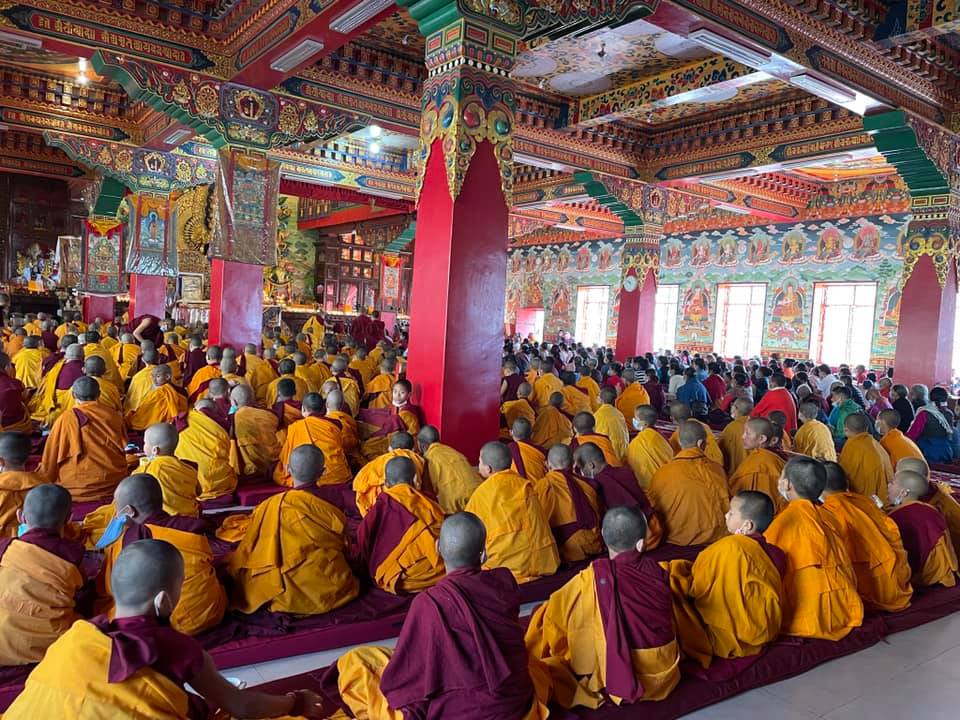
Lama Zopa Rinpoche teaching at Khachoe Ghakyil Ling, Nepal. Photo by Ven. Sarah Thresher.
Rinpoche has been offering regular teachings at Khachoe Ghakyil Ling, also known as the Kopan Nunnery, for the past three weeks. These teachings are being translated into Nepali from Tibetan, providing a rare opportunity for Nepali people to have access to Rinpoche’s teachings in their own language. These teachings are available on the FPMT Tibetan YouTube channel. Half in attendance at the teachings are nuns and half are people from outside the nunnery. Topics taught include what is and is not holy Dharma, the eight worldly dharmas, the preciousness of this human rebirth, karma, proper motivation, the importance of a good heart, and the kindness of the enemy. Rinpoche offered a White Tara jenang and the oral transmission of the Vajra Cutter Sutra. The teaching series will end with a Medicine Buddha initiation.
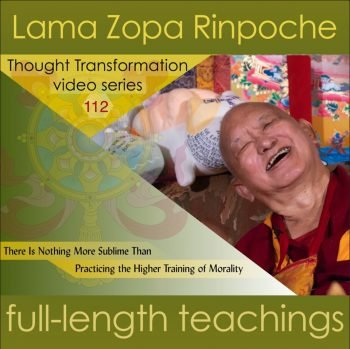
A recent podcast episode.
“Of all practices, the practice of kindness is best,” Rinpoche emphasized during these teachings. “Of all forms of education, the best education is how to be a kind person. Parents should teach their children to have a kind heart from a young age. That will help them the most when they grow up. It will help their friends, their neighborhood, their town, their country, the world.”
A new podcast series featuring full-length teachings by Lama Zopa Rinpoche was recently launched. Each episode corresponds to a new video in the ongoing series of Rinpoche’s thought transformation teachings. Episodes are released shortly after the latest video teaching and blog are published, so listeners have access to the transcript and other materials associated with a specific teaching. For the podcast episodes, pauses have been shortened and background noise reduced, but otherwise the teachings are unedited. Currently we have podcast episodes for Rinpoche’s video teachings from July 2021 onward (videos 102–123).
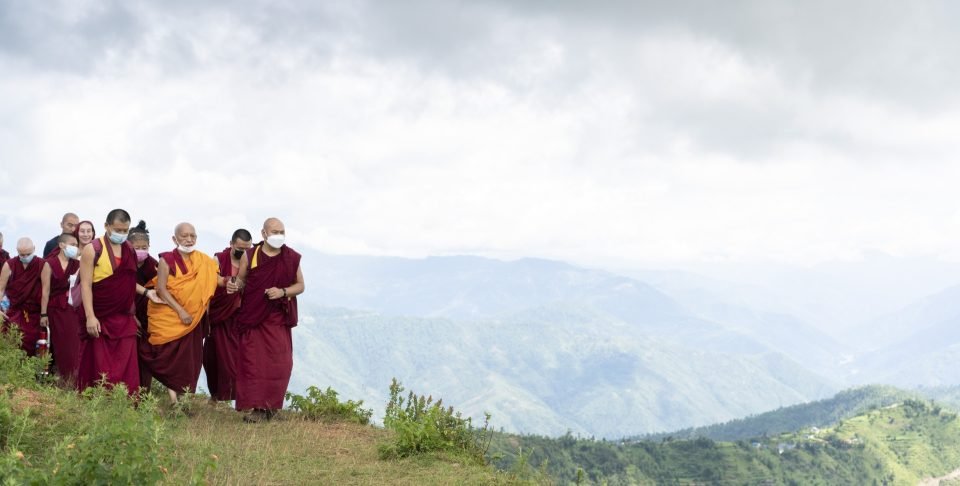
Lama Zopa Rinpoche walking to offer puja on the land in Maratika where the giant Padmasambhava statue will be built, Nepal, September 2021. Photo by Ven. Lobsang Sherab.
Rinpoche Travels to Maratika
In September 2021, Rinpoche returned to Maratika along with Kopan lama gyupas monks and nuns to bless the land where a 45-foot (14-meter) tall statue of Padmasambhava (Guru Rinpoche) on a 15-foot (4.5-meter) tall throne will be built. The statue will be in the aspect of Padma Gyalpo, Padmasambhava’s magnetizing form, and will be made of bronze and plated with gold. It is expected to take around five years to complete. During this visit, Rinpoche spent time meeting with some local people, including the mayor of Maratika. He offered teachings to two hotel owners. He also blessed the goats in Maratika liberated for his long life, gave two online Zoom teachings, and visited the main cave, which was opened only for Rinpoche, to make special prayers at the long life vase.
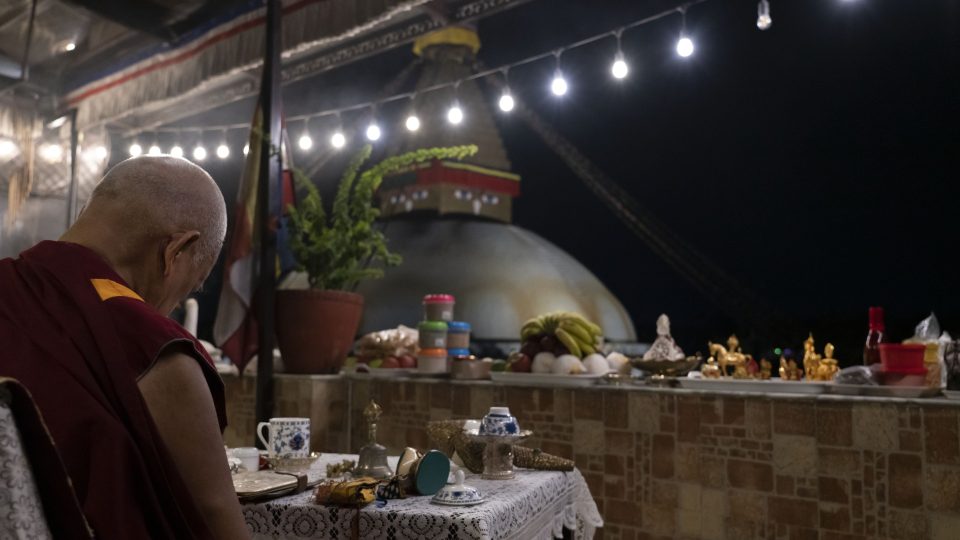
Lama Zopa Rinpoche offering puja in front of Boudhanath Stupa, Nepal, October 15, 2021. Photo by Ven. Lobsang Sherab.
Rinpoche Circumambulates and Makes Offerings to Stupas
While Rinpoche is in Nepal, he frequently goes to visit the great stupas of Boudhanath and Swayambhunath to circumambulate and make offerings and prayers. Sometimes Rinpoche goes in the evenings, sometimes after teachings, sometimes on the way back from trips in Kathmandu or other places.
When Rinpoche goes to Boudha Stupa he usually does korwa while reciting the mantras that increase the power of making circumambulation. Students in attendance join in as Rinpoche recites out loud In Praise of Dependent Origination by Lama Tsongkhapa, followed by several repetitions of the Confession of Downfalls to the Thirty-five Buddhas and Vajrasattva mantra to purify. At the end of the circumambulations, Rinpoche leads a group offering of five-colored khatas to the stupa and dedication prayers. During the circumabulations, Rinpoche also likes to offer incense and rice visualized as wish-granting jewels, bless the dogs, and turn the prayer wheels.
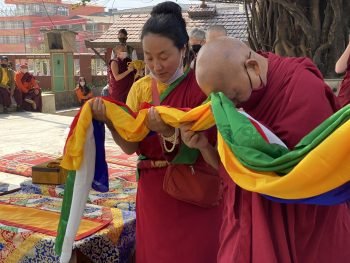
Lama Zopa Rinpocha and Khadro-la offering five-colored khata at Swayambhunath Stupa on Lhabab Duchen. Photo by Ven. Roger Kunsang.
When Rinpoche goes to Swayambhunath, he circumambulates around the base of the hill. As Rinpoche circumambulates, he recites prayers, offers rice visualized as wish-granting jewels, and rejoices for all those who helped construct the many prayer wheels and stupas that encircle the hill. Rinpoche stops at a special Padmasambhava statue to chant prayers and pray for His Holiness the Dalai Lama and Tibet. Rinpoche also stops at the local cremation grounds to recite prayers for those who have recently died and whose corpses are being burned.
On Lhabab Duchen Rinpoche offered pujas, prayers, and five-colored khatas with Khadro-la (Rangjung Neljorma Khandro Namsel Drönme) at Swayambunath. You can read more about the activities sponsored during this merit-multiplying Buddha day.
Winter Debates at Kopan
Monks have held the Jang Guncho, the winter debate festival, for centuries. The first Nuns’ Jang Guncho took place in Dharamsala, India, in 1995. Jang Guncho is an opportunity for ordained Sangha to gather together to train in and practice debate. Lama Zopa Rinpoche attended the winter debates of both Kopan Monastery and Khachoe Ghakyil Ling early this October.
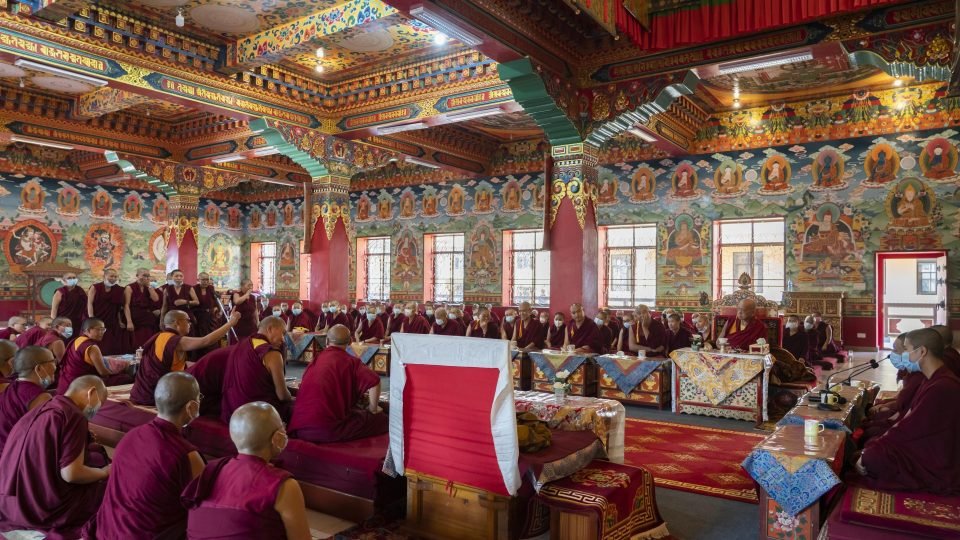
Lama Zopa Rinpoche attending the winter debate of the nuns of Khachoe Ghakyil Nunnery, Nepal, October 11, 2021. Photo by Ven. Lobsang Sherab.
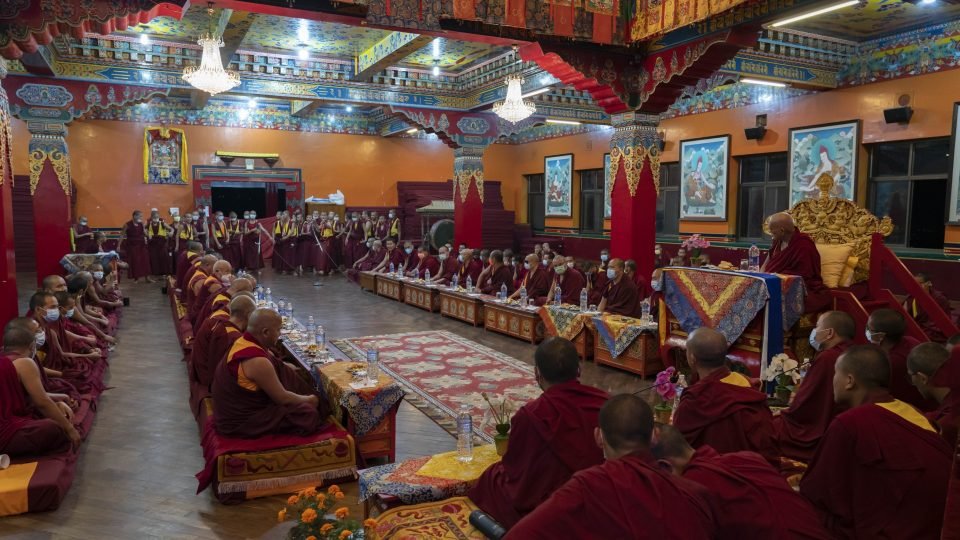
Lama Zopa Rinpoche attending the winter debate of the monks of Kopan Monastery, Nepal, October 8, 2021. Photo by Ven. Lobsang Sherab.
Rinpoche Offers Encouragement and Advice during the Fortieth Anniversary Celebrations of Two FPMT Centers
Nalanda Monastery, the FPMT monastery in the south of France, has been celebrating its fortieth anniversary this year. In October, Rinpoche offered the Nalanda community an encouraging and joyful talk from Kopan Monastery, urging everyone to meditate strongly on impermanence and death in order to change worldly dharma into holy Dharma. Rinpoche also praised those who are Sangha in the West, explaining that they are the “real heroes” due to the “incredible renunciation” of becoming ordained.
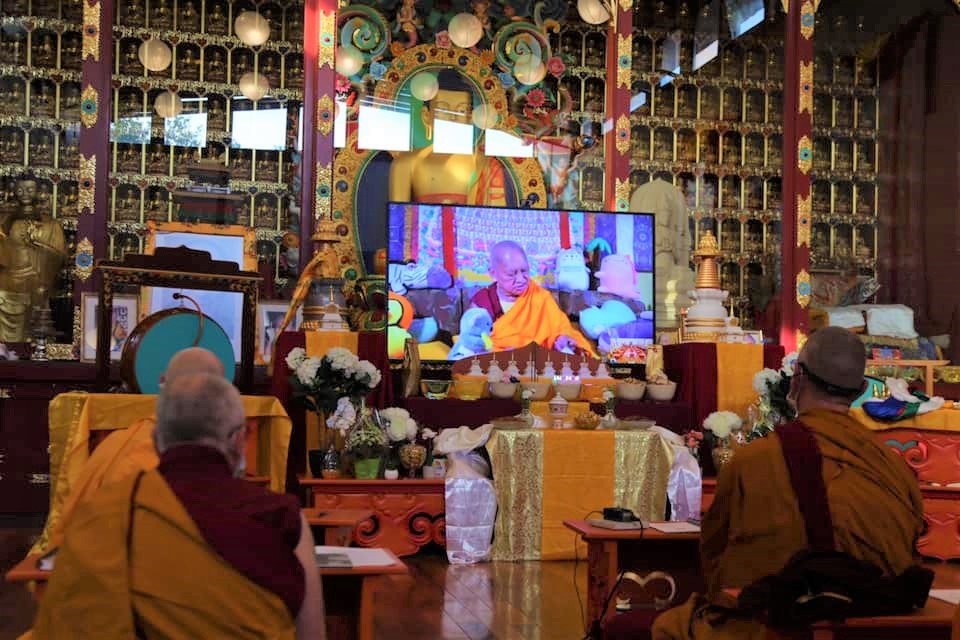
Lama Zopa Rinpoche offering a talk to the Nalanda Monastery community, France, October 18, 2021. Photo courtesy of Nalanda Monastery’s Facebook page.
Buddha House, an FPMT center located in a suburb of Adelaide, South Australia, also celebrated its fortieth anniversary this year. In October, Rinpoche offered a teaching via video on the importance of FPMT centers and on emptiness. “You can see how it is most important for the center to exist!” Rinpoche said. “[Centers share] Lama Tsongkhapa teachings, Buddha’s teachings. [Centers create] an opportunity for sentient beings to study, to learn with no mistakes! Thank you very much!” We look forward to sharing video of this teaching with you and a summary of the main points Rinpoche expressed. (Extensive advice from Rinpoche is always available on the benefits of offering service as well as on the benefits of centers and the FPMT Organization. See Rinpoche’s Advice page.)
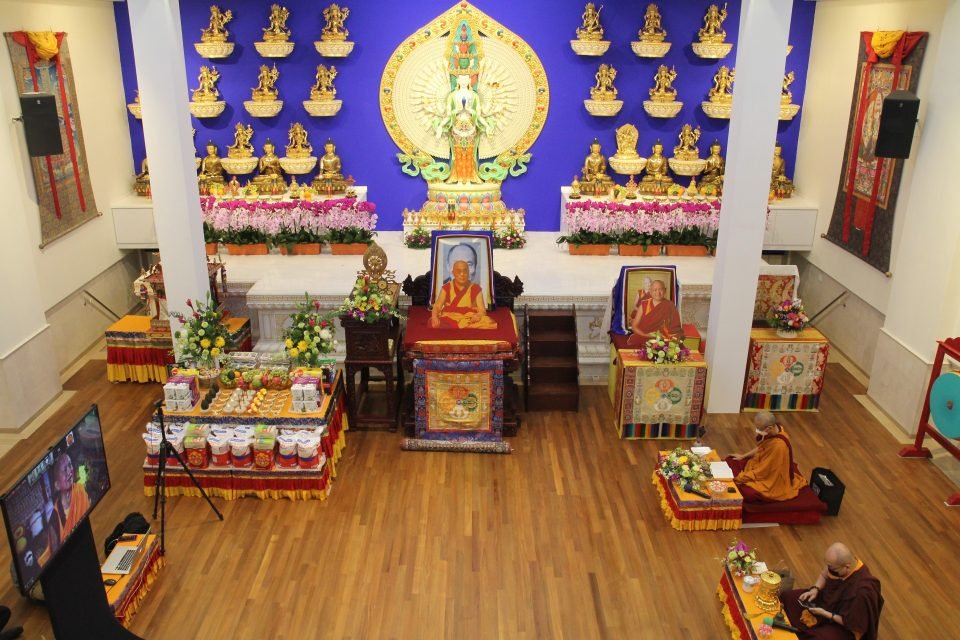
Thousand-Arm Chenrezig statue and Twenty-one Tara statues at Amitabha Buddha Centre with image of Lama Zopa Rinpoche offering a talk via video, Singapore. Photo courtesy of ABC.
Twenty-one Tara Statues Consecration at Amitabha Buddhist Centre
In 1995, Lama Zopa Rinpoche advised Amitabha Buddhist Centre (ABC) in Singapore to buy land and build on it a dedicated temple that has as its central image Thousand-arm Chenrezig surrounded by the Twenty-one Taras. The land was bought in 1998. Construction began in 2003. And in 2007, the center opened its doors. The Thousand-arm Chenrezig statue was completed in 2016. And this year, the Twenty-one Tara statues were completed and consecrated on October 27.
ABC organized a celebratory event for the consecration, which was broadcast live over several online platforms with translations offered in seven languages. Lama Zopa Rinpoche did the consecration of the statues via Zoom from Kopan Monastery. He also gave a teaching and made strong prayers for the statues to be of great benefit to sentient beings. Nine hundred people joined via Zoom with a thousand others joining on Facebook Live. Center Director Tan Hup Cheng offered an opening speech for the event. There was a short video of how the statues were made in Nepal and installed on the altar. Khenrinpoche Geshe Chonyi, ABC’s resident teacher, unveiled the statues. Ven. Sangye Khadro and Ven. Thubten Chodron shared congratulatory messages via video, including a moving prayer to Tara, which had been translated by Lama Yeshe from the Cittamani Tara long sadhana. The program ended with extensive dedications. We are pleased to share video of this auspicious event. A complete transcript of this teaching, as well as more photos and details of the event will be shared in the near future.
Please Enjoy New Photos of Rinpoche’s Recent Activities
Please join us in rejoicing in all of Rinpoche’s beneficial activities for others! We have created a new photo album of Rinpoche, including many activities we didn’t mention above, which we invite you to enjoy.
Visit the September–October 2021 photo album:
https://fpmt.org/teachers/zopa/gallery/nepal-september-october-2021/
Lama Zopa Rinpoche is the spiritual director of the Foundation for the Preservation of Mahayana Tradition (FPMT), a Tibetan Buddhist organization dedicated to the transmission of the Mahayana Buddhist tradition and values worldwide through teaching, meditation and community service.
Watch the video series Lama Zopa Rinpoche’s Teachings on Thought Transformation during the Time of COVID-19 and find links to videos in transcripts, MP3s, additional practice advice, and more:
https://fpmt.org/fpmt/announcements/resources-for-coronavirus-pandemic/advice-from-lama-zopa-rinpoche-for-coronavirus/
- Home
- News/Media
- Study & Practice
- About FPMT Education Services
- Latest News
- Programs
- New to Buddhism?
- Buddhist Mind Science: Activating Your Potential
- Heart Advice for Death and Dying
- Discovering Buddhism
- Living in the Path
- Exploring Buddhism
- FPMT Basic Program
- FPMT Masters Program
- FPMT In-Depth Meditation Training
- Maitripa College
- Lotsawa Rinchen Zangpo Translator Program
- Universal Education for Compassion & Wisdom
- Online Learning Center
- Prayers & Practice Materials
- Overview of Prayers & Practices
- Full Catalogue of Prayers & Practice Materials
- Explore Popular Topics
- Benefiting Animals
- Chenrezig Resources
- Death & Dying Resources
- Lama Chopa (Guru Puja)
- Lama Zopa Rinpoche: Compendium of Precious Instructions
- Lama Zopa Rinpoche: Life Practice Advice
- Lama Zopa Rinpoche Practice Series
- Lamrim Resources
- Mantras
- Prayer Book Updates
- Purification Practices
- Sutras
- Thought Transformation (Lojong)
- Audio Materials
- Dharma Dates – Tibetan Calendar
- Translation Services
- Publishing Services
- Teachings and Advice
- Find Teachings and Advice
- Lama Zopa Rinpoche Advice Page
- Lama Zopa Rinpoche: Compendium of Precious Instructions
- Lama Zopa Rinpoche Video Teachings
- ༧སྐྱབས་རྗེ་བཟོད་པ་རིན་པོ་ཆེ་མཆོག་ནས་སྩལ་བའི་བཀའ་སློབ་བརྙན་འཕྲིན།
- Podcasts
- Lama Yeshe Wisdom Archive
- Buddhism FAQ
- Dharma for Young People
- Resources on Holy Objects
- Ways to Offer Support
- Centers
- Affiliates Area
- Teachers
- Projects
- Charitable Projects
- Make a Donation
- Applying for Grants
- News about Projects
- Other Projects within FPMT
- Support International Office
- Projects Photo Galleries
- Give Where Most Needed
- FPMT
- Shop
Translate*
*powered by Google TranslateTranslation of pages on fpmt.org is performed by Google Translate, a third party service which FPMT has no control over. The service provides automated computer translations that are only an approximation of the websites' original content. The translations should not be considered exact and only used as a rough guide.I encourage people not to express their anger, not to let it out. Instead, I have people try to understand why they get angry, what causes it and how it arises. When you realize these things, instead of manifesting externally, your anger digests itself. In the West, some people believe that you get rid of your anger by expressing it, that you finish it by letting it out. Actually, in this case what happens is that you leave an imprint in your mind to get angry again.







